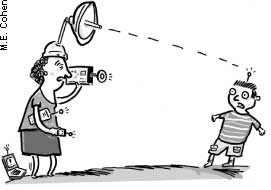Thanks For Nothing.

"...Living without God today means facing life and death as no generation before us has done. It entails giving meaning to our lives not only in the absence of a supreme being, but now without the forces and trends that gave hope to the past several generations of secularists. We who live after progress, after Marxism, and after the Holocaust have stopped believing that the world is being transformed by reason and democracy. By the beginning of the twenty-first century, the modern faith that human life is heading in a positive direction has been undone, giving way to the earlier religious faith it replaced, or to no faith at all. Alone as never before, in a universe scientifically better understood than ever, we find little in its almost-infinite vastness to guide us towards what our lives mean and how we should live them.
To answer these questions anew, agnostics, atheists and secularists must absorb the experience of the twentieth century and the issues of the twenty-first. We must face today's concerns about forces beyond our control and our own responsibility, shape a satisfying way of living in relation to what we can know and what we cannot know, affirm a secular basis formorality even while, especially in the United States, religion is being trumpeted as essential to living ethically, formulate new ways of coming to terms with death, and explore what hope can mean after the collapse of Enlightenment anticipations.
The first step of such a project concerns paradoxically, the issue of giving thanks. Gratitude, central to Judaism, Christianity, and Islam, is virtually absent from our secular culture, except in relation to the “oughts” of individual interactions. But this deprives living without God of much of its coherence and meaning. My thesis is that there is much to be grateful for. Exploring this feeling and idea, so little noticed from a secular point of view, opens a new way of experiencing our relationship with forces and beings beyond our individual selves..."






